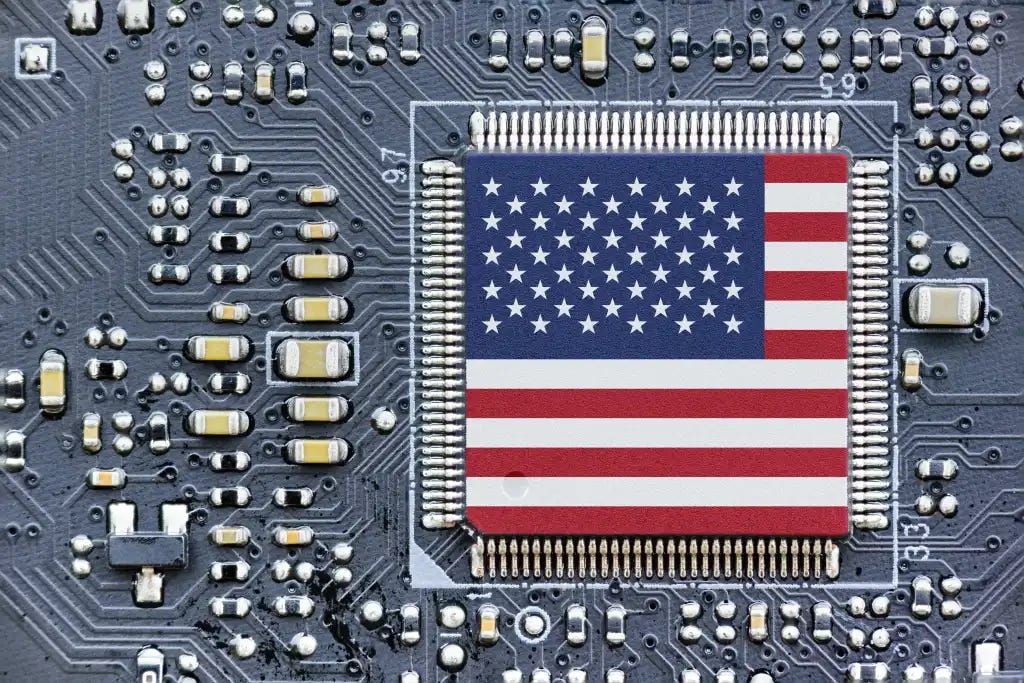Buying back CHIPS
The only way to stop public money from being siphoned off to shareholders and top executives
Friends,
One of my goals in writing this letter is to expose where government needs to take a stronger hand to safeguard the public interest from corporate avarice.
I applaud the economic policies of the Biden-Harris administration, which have abandoned the neoliberal claptrap of former Democratic administrations and come down on the side of working people.
But I also want those policies to work. The administration’s commendable goal of reviving America’s semiconductor industry by subsidizing new chip factories in the United States is today endangered by the increasing likelihood that those subsidies will enrich big shareholders and CEOs rather than strengthen our semiconductor industrial base.
So far, nearly $30 billion in federal CHIPS grants have been awarded, with the grants going to 11 semiconductor producers.
But the major goal of these producers is not to revive America’s semiconductor industry. It’s to raise their share prices. Most of these producers have spent billions buying back their shares of stock in order to do just that.
As I’ve emphasized in previous letters to you, stock buybacks increasingly are being used by corporations to satisfy Wall Street’s insatiable demand for higher share prices.
But every dollar the semiconductor producers spend on buybacks is a dollar not spent on innovation for long-term competitiveness.
This contradiction between the public interest in a strong American semiconductor industry and corporate interests in high stock prices creates a significant risk that public subsidies in the CHIPS Act will be siphoned off to shareholders and top executives through stock buybacks.
Taxpayer money should not be used to boost share prices and CEO pay. Recipients of this money should not be allowed to engage in stock buybacks.
The first CHIPS grant of $35 million went to BAE Systems in June 2023. At the time, BAE was in the midst of a $2 billion stock buyback; another nearly $2 billion in stock buybacks has been authorized by BAE’s board.
Intel, America’s largest homegrown producer of semiconductors and already the recipient of $8.5 billion in CHIPS money has been authorized by its its board to buy back a further $7.24 billion of its own shares of stock. (Meanwhile, the administration has promised Intel nearly $20 billion in grants and loans.)
Intel spent $30.2 billion on buybacks between 2019 to 2023. It also assured investors last year that the company remained committed to delivering “very healthy” dividends.
All told, semiconductor producers now in line for $30 billion in public subsidies spent more than $41 billion on stock buybacks between 2019 and 2023.
Their CEOs — whose compensation packages are larded with stocks and stock options — have every incentive to continue pumping up their own corporations’ stock prices with buybacks.
According to a recent report from the Institute for Policy Studies and the Americans for Financial Reform Education Fund, CEOs whose corporations have entered into preliminary CHIPS agreements with the government hold more than $2.7 billion worth of stock in their companies ($306 million on average). They therefore stand to personally benefit from buybacks.
CHIPs money is being distributed to these corporations by the Commerce Department. Secretary of Commerce Gina Raimondo has given personal assurances that “CHIPS money is not a subsidy for big companies … for stock buybacks or to pad their bottom line.” The Department has stated that when awarding grants, it will give preference to companies who commit to not engage in stock buybacks.
But none of the companies receiving CHIPS subsidies has publicly committed to suspending their existing stock buyback plans.
The Commerce Department has only asked applicant corporations to detail their plans for stock buybacks over five years. (These applications and the subsequent agreements are not public.)
Moreover, it’s relatively easy for big corporations to shift money among units or subsidiaries to obscure buybacks, especially if other corporations buy parts of them or if outside private equity investors control parts of their operations.
Intel is a case in point. The chipmaker Qualcomm is now considering buying parts of Intel’s design business and possibly its foundry unit. And the giant private equity firm Apollo Management is likely to make a big investment in Intel (Apollo has already bought a stake in Intel’s chip-manufacturing operation in Ireland).
Given the increasing pressure from Wall Street and CEOs to use stock buybacks to boost share prices, the administration must ensure that public subsidies improve the semiconductor manufacturing base and do not merely enrich shareholders and CEOs.
How do do this? My humble advice to the Secretary Raimondo and the Biden-Harris administration: Bar all semiconductor producers who receive government subsidies from making stock buybacks. Make the prohibition explicit in all final CHIPS subsidy contracts.


That's just not right. Corporations raiding the public coffers has gone on for far too long. Especially with the help of the Government. Shameful. And especially when they're already making record profits. Thank you as always Professor Reich for your clear and concise explanation of the facts. Appreciate you!! ❤️🇺🇸💙
Strong government is the backstop of efficient capitalism, Reagan be damned. But it requires a democracy, and we don't have a proper functioning democracy in America. The choice between a sane, intelligent President, and a nutcase, could be decided by a single congressional district in ruby-red Nebraska.